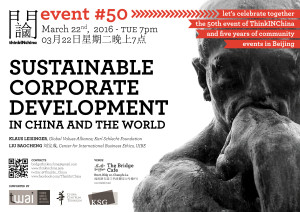

Speakers
Klaus LEISINGER, Professor of Sociology, University of Basel; President, Global Values Alliance; Senior Adviser, Karl Schlecht Foundation.
LIU Baocheng 刘宝成, Director of the Center for International Business Ethics at the University of International Business and Economics (UIBE, China).
ABSTRACT
The “2030 Agenda for Sustainable Development”, adopted by the international community in 2015, is a plan of action for people, planet and prosperity. It seeks to strengthen universal peace in larger freedom. Eradicating poverty is the greatest global challenge and an indispensable requirement for sustainable development. All countries and all citizens, including corporate citizens, acting in collaborative partnership, will implement this plan. Bold and transformative steps that are urgently needed to shift the world onto a sustainable and resilient path.
Due to the complexity and dimensions of our global development challenges, more than ever before, successful sustainability endeavors depend on multi-stakeholder partnerships that “mobilize and share knowledge, expertise, technology and financial resources, to support the achievement of the sustainable development goals in all countries, in particular developing countries”. Corporations – the single most efficient source of economic activity and innovation – ought to play a leadership role in this particular kind of values management. To effectively do so, the values management terms compliance and integrity, have to be defined in a broader manner and a third term, compassion, usually not part of corporate language and work streams, will have to be included.
Corporate Sustainability Management along these lines could be interpreted as introducing care, responsibility, respect and knowledge as a leadership component for sustainable business success.
In the case of China’s corporate world, although consensus has been reached over the general notion of sustainable development, companies continue to retain vastly disarrayed agenda and priorities. At the macro level, the urge to retain GDP growth rate, accelerated drive toward nationwide industrialization and urbanization, endowment curse of energy structure, as well as local protectionism, all of these elements present looming challenges against environmentally friendly behavior. At the corporate level, high variation in ownership structure, corporate size, governance and location also lead to different compliance and social impact.
Join ThinkIN China for the grand opening of our activities in 2016 and for celebrating with all of us the outstanding result of organizing our 50th event!